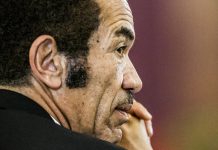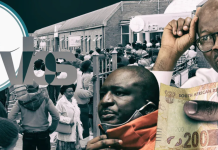By Anna Shinana | 1 January 2021
THE Ileni Mwitaleleko shelter, whose name translates to “Come and see for yourselves”, has given visually impaired women a fresh lease of life but they claim they have been left on their own.
The centre, situated at Oniipa in Oshikoto region, is a hive of activity as about 30 elderly women weave baskets from straws. There is confusion over who administers the centre.
Most of the women, who hail from Oshana, Oshikoto, Ohangwena and Omusati regions, have lived at the centre, since it was established in 1997. They have found happiness and support in each other’s company.
Initially, the centre catered for people with different disabilities, and trained them in knitting, sewing and weaving. Those who acquired skills were expected to go out and earn a living from their skills to open space for new intakes.
However, some inmates allegedly refused to leave the centre although they refuted these claims, saying they were never asked to vacate the centre, which they helped to set up.
Elizabeth Nande (71) sits on her mattress weaving her basket with great precision and expertise. She says she learnt the craft from her home village of Okaku as a young woman before she came to the centre in 1997.
Other women also silently sit on their mats, weaving baskets.
Nande can weave two baskets a day, which are sold to the community for between N$30 and N$50.
“I left my home just after this centre was set up, because I felt it was a good initiative to help people who are visually impaired like me to come together and create something to earn a living,” she said.
“Everything started well, there were many of us here when the centre was under the Ministry of Health and Social Services and another organisation.
“We would knit clothing items and weave baskets for sale at the open markets or to people who came here to buy them. This enabled us to sustain ourselves and maintain the place,” says Nande.
“We have not refused to go back to our homes and we have never been expected to leave. How could we leave when we are still able to work and be productive? Yes, there are those who left to work on their own after gaining skills from the centre but they left on their own,” claimed Nande.
She said the organisations responsible for the place stopped funding it, saying the women should generate money from their products.
“The problem is that even though we appreciate that this centre was set up, we feel neglected, no one comes here to check up on us any more. We cannot go to the market to sell our baskets because we are blind, our water and electricity have been cut off, we are not making much money from the items we make because we can’t sell them and they are piling up.
“We now just depend on our monthly disability grants of N$1300, which is not enough to sustain this place. We need food and clothes and hospital fees,” she added.
Olga Mokongelwa from Ohangwena region came to the centre in 2007.
“I am grateful for this centre, here I found people who are like me, to whom I relate. We spend the day weaving baskets but we have no support, we don’t have enough weaving materials and we have no one to source them for us. We also have a lot of sewing machines that are idle because we don’t have any materials.
“How are we supposed to make money to sustain ourselves? We can go for three months without a single sale of our baskets and when we get customers they don’t pay a fair price for them,” charged Mukongelwa.
Lempie Ndlataa Kamati, the project manager at the Evangelical Lutheran Church in Namibia centre for the disabled based at Oniipa has been involved with the centre since its inception.
He blames the dilapidated state of the centre on the inmates refusing to let the government take over its administration.
“You must first understand the background of that project. The kukus established that project by applying for a plot from the headman and erecting a shelter from corrugated zinc sheets.
“The Ministry of Lands and the Ministry of Health decided to build a proper structure equipped with sewing machines, refrigerators and stoves, and it was well maintained. It was a perfect arrangement since both projects fell under the Ministry of Health,” said Kamati.
“When the centre was under the supervision of Elcin and the health ministry it was decided that the centre caters for all disabilities but the kukus did not want that. They felt the government wanted to take over. The government withdrew funding and gave back the centre,” charged Kamati.
“We understand the women feel neglected and abandoned, but who is to blame? They wanted to take care of their own affairs but they cannot manage. I know that they need assistance. In the past, we provided them with transport to take their products to markets, but we are not involved any more.
Health executive director Ben Nangombe acknowledged that the Ileni Mwitaleleko centre is registered with the ministry as a welfare organisation.
“I don’t understand accusations that the ministry neglected the centre. The ministry’s task is to ensure that welfare organisations registered with us comply with regulations and requirements. In the past, the ministry used to subsidise the centre and others that met requirements like providing audited statements and details on the management of the institution,” said Nangombe.
He said he will check to confirm the status of the centre.
* This story was produced with funding from the Google Grant






